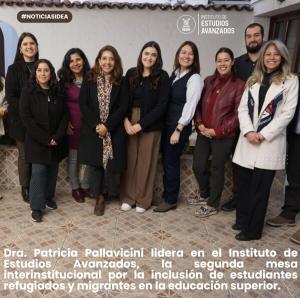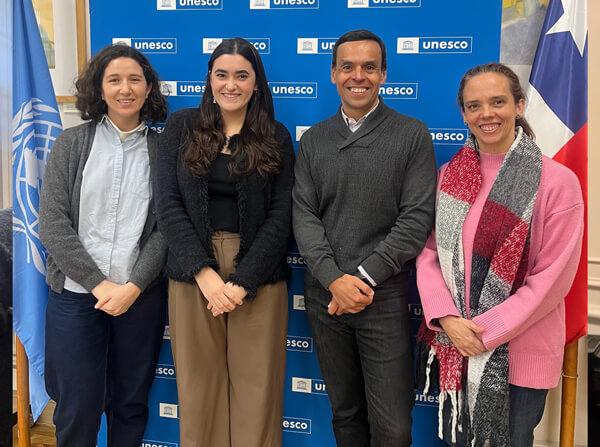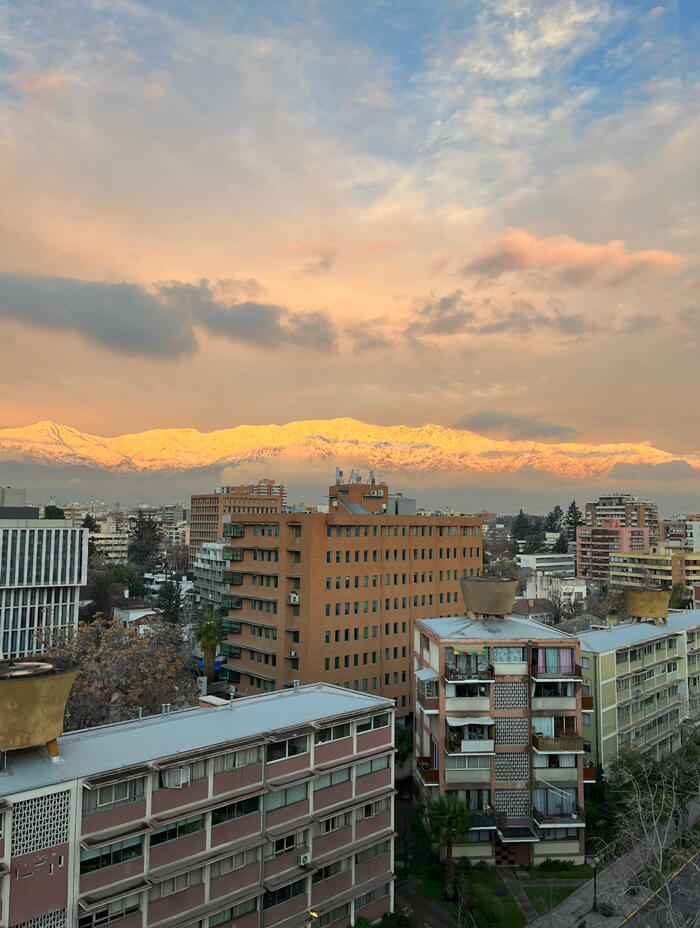I write this as I’ve officially left Chile and arrived back in D.C., nervous about the future but immeasurably grateful for my summer/winter—s’winter—at “the end of the world”, a nickname lovingly bestowed to the country. I left Chile the way I started, by befriending yet another kind Chilean on the plane ride home, a testament to the kindness that was so easily felt during my experience there.
My second month in Chile squared around the self-confidence I had finally felt in speaking Spanish for professional and personal use, ultimately trying to balance being present while preparing for my life in the U.S. after the internship.
Refugee/Migrant Education Team Work:
In early July, I was given the opportunity to present my Refugee Educational Advancement Lab (REAL) research initiatives to UNESCO’s Third Roundtable on the Inclusion of Migrant and Refugee Students in Higher Education in Chile, hosted at the University of Santiago. As I previously explained, this group consists of various stakeholders in the university sphere including university staff, governmental partners, and non-profits/civil society. The goal of the working group is to collaborate to understand the largest challenges for migrant students trying to access/complete higher education, and problem-solve solutions, such as focus group committees.

With my utmost confidence, I presented in my best Spanglish (a combination of Spanish and English) to a very patient and attentive audience. I summarized the work of the REAL initiative I lead called the “DMV Regional Communities of Practice”, and its outcomes including a Resource Bank, two convenings, and strengthened networks. My presentation also centered around how the REAL team adapted to the current presidential administration, whose policy actions had negatively impacted some of our original goals, requiring us to regroup and focus on community collaboration to achieve newly formed objectives. Similar to the US, Chile has also struggled to create accessible systems of opportunity for its increasing migrant population. Much like home, the political narrative around immigrants’ rights has been a central policy focus of Chile’s upcoming presidential election. By illustrating how my small REAL team stayed resilient and adaptable under precious times both for migrants and universities, I hoped to show the Chilean staff at the presentation the possibilities of being flexible while still focusing on a shared goal. The response from attendees was overwhelmingly positive, with multiple sharing that they felt REAL was brave and creative in continuing their work under such politically charged times.


If I’m honest, I harbored a large sense of guilt of being away from home at a time of such instability for migrants and refugees, but finding solidarity, new perspectives, and a sense of community during my short time in Chile was such a virtue. Migration, much like nearly every country around the world, continues to be a contentious and emotional topic in Chile and the US. I felt grateful to gain new perspectives and language skills, while staying true to my values surrounding human rights regardless of where I live. Moreover, I felt so grateful for the opportunity to improve both my Spanish language skills and understanding of Latin American culture, making me more prepared to support Latino communities now that I’m home.
Special Education Team Initiative:
July was easily my favorite month in Chile, in part due to the absolutely memorable project with my special education team that has left a lasting impression on me. I participated in a four-day pilot program on special education knowledge-sharing, organized by the Chilean Ministry of Education and UNESCO, and attended by four local and government representatives from Guatemala and Paraguay. During the week, our team visited schools and centers, engaging in conversations on best practices, legal frameworks, and common themes in special education. Chile was selected to host the program due to its incredible improvements in special education over the last 15 years.
I oversaw the role of paying close attention to the overarching themes of the week, asking constant questions of reflection to the visiting representatives, and keeping watch of which topics piqued their interest. With that information, I summarized the week with a surprise video and co-planned a reflection workshop with my supervisor at UNESCO. At the time of our four-day program, I had just accepted a new job as a Special Education teacher in D.C, and I found personal inspiration from the best practices as well. In fact, my excitement for new ideas, connections, and further areas of research was non-stop. Some topics I really enjoyed included:
- The importance of interdisciplinary approaches, including multi-lingual learners, AfroLatinos, Girls, etc.
- The role of positive, effective upper administrative support (ex. good principals, knowledgeable curricular staff)
- Student advocacy skills, secondary transition and career exploration.
The four day program occurred during my second to last week in Chile, which meant I finally possessed the foundational skills to be at least moderately prepared for listening/speaking about these topics entirely in Spanish. Nevertheless, those four days consisted of the most Spanish I had ever heard, read, listened to, and spoken, with one day lasting 12 hours. Regardless of my brain hurting, it was undoubtedly the best week of my internship. In that short time, I formed close bonds with both the Chilean Ministry of Education staff and the foreign representatives, calling them my "tias"(aunts) by the second day and them calling me "nuestra hija"(our daughter). They have since invited me to their countries and wished me luck on the first day of teaching Special Education in the US.
Visiting an elementary and high school leading in best practice for special education:




Visiting a center that supports people with visual impairments to integrate and find employment:



The team going around Santiago and Valparaiso to engage in collaborative conversations with school and government staff:





There’s an abundance of stories, lore, challenges, and strengths I could share about my short two months in Chile, but I’ll leave off with this, my goal was to learn Spanish the uncomfortable way. And while I’m certainly not perfect, I would say I achieved that. UNESCO and living abroad, like anything, comes with its natural ups and downs. Some days at the office were incredibly boring and isolated, others I was in a van zipping around Valparaiso with a car full of six different Spanish accents. Some days I had to sit with the fear that I potentially offended someone or was woefully misunderstood, and other moments I spoke such convincing, passionate Spanish to the point of being invited to speak elsewhere. And that, as I have learned now having lived in my 5th country, is just a part of the process. The acceptance that emotions are high, time is short, and opportunities are everywhere, they just may not look “normal.” Success for me was defined as practicing Spanish as often as possible, trying to understand the heart of Chile as a country, including its people, food, places, history, etc, and getting to work for an international organization. Thankfully, I achieved all three to the best of my ability.
I slowly learned that my goal was to seek connection over perfection in all aspects of my life. There were many moments that challenged me in Chile, grappling with my own tolerance and impulsivity while talking politics, being linguistically uncomfortable, feeling underutilized at work, and the list goes on. But in my largest challenges, my constant commitment to connect with others and allowance to be humbled around every corner always seemed to work. With that, I extend my deepest gratitude to the GSEHD team, my colleagues at UNESCO, and my new friends from Chile and beyond who shaped my experience. Nos vemos pronto!
Exploring Santiago:







Last day at the UNESCO office with my supervisors and mentors:


Goodbye activities with friends:



Bonus: I took a last minute trip to a southern city called Pucón, which is a part of the Northern Patagonia region. With a temperate rainforest climate, this region of Chile is known for its hot springs, waterfalls, volcanoes, and lakes. While visiting, I befriended an outgoing Mexican exchange student in my hostel, who happened to be doing the same 12 day hour tour as me. This was hands down one of the most beautiful adventures of my life!







Mia Cleary is a M.A. Candidate in the International Education Program at the George Washington University. She focuses on cultural exchange/knowledge-sharing and inclusive education, particularly for refugees/migrants and students with disabilities.


